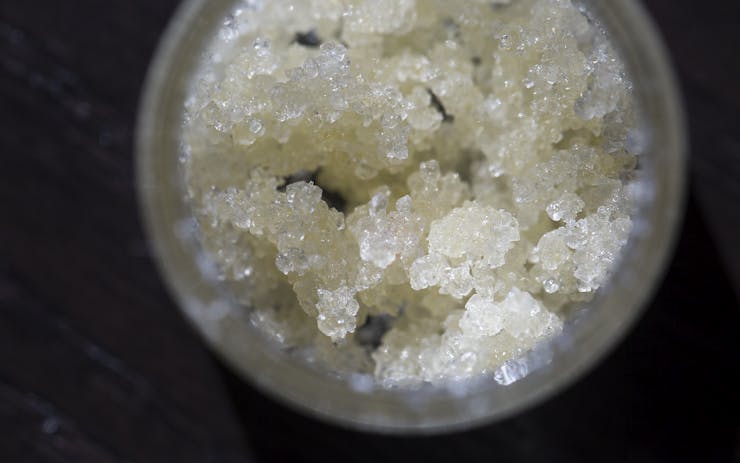THCA, short for tetrahydrocannabinolic acid, is a non-intoxicating compound produced by the cannabis plant. It is the precursor of THC that occurs in live cannabis plants: THCA converts into THC slowly over time or more immediately in the presence of heat, such as when you use a lighter to smoke. THCA is commonly consumed by juicing raw cannabis leaves, though it can also be prepared into oils and other products.
“I’m looking for a liquid cannabis extract that’s high in THCA.”
“You have to first convert THCA into THC before you make edibles with your weed.”
What is THCA?
THCA is a compound that is abundant in raw cannabis plants. After the plant is harvested and dried, THCA slowly converts to THC, the compound in cannabis chiefly responsible for a euphoric high. However, when you purchase cannabis, these dried buds still contain mostly THCA—not THC. In order to convert the rest of the THCA into THC, you must apply heat by smoking the buds with a lighter or by vaporizing them.
This conversion process of turning THCA into THC is called decarboxylation, because it involves removing carbon atoms from carbon chains. In cannabutter recipes, instructions always mention that cannabis needs to be decarboxylated in an oven in order for edibles to deliver potent effects—that’s because the THCA needs to be converted into THC.
Benefits of THCA
Research has yet to thoroughly explore the therapeutic benefits of THCA, however consumers typically use this cannabinoid to treat inflammation in conditions like arthritis and lupus. THCA may also have neuroprotective, antioxidant, and anti-nausea properties. For those who prefer to not feel high, THCA has the added benefit of being non-intoxicating, meaning it will not produce the euphoric (or anxious) effects commonly associated with THC.
The difference between THCA and CBD
Both THCA and CBD are non-intoxicating cannabinoids found in the cannabis plant. The therapeutic profile of THCA is not fully understood, although it is popularly used for inflammation symptoms. CBD is similar in that it too seems to help with inflammation, though more research is available to describe its potential medical applications. CBD uniquely interacts with the body to produce not only pain and inflammation relief, but a myriad of other therapeutic benefits such as seizure and anxiety management.
THCA and CBD also differ in availability. It can be difficult to get your hands on THCA; although it is abundant in dried cannabis flower, there aren’t many practical ways to consume or extract it without converting it to THC. That’s why consumers often juice raw cannabis leaves to procure THCA, but most do not have access to live cannabis plants due to restrictive cultivation laws. CBD, however, is easy to find both in cannabis shops and through online retailers. Because it has become such a popular product, it is generally available in many forms, including flower, oil extracts, lotions, capsules, edibles, and more.
